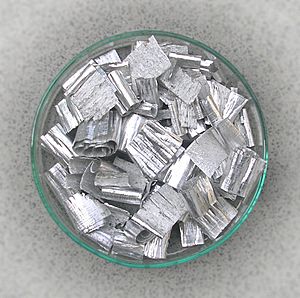Reactivity (chemistry) facts for kids
Reactivity is how much a material wants to change or mix with other things. Some materials react a lot, and others react very little.
Contents
What is Reactivity?
Reactivity tells us how easily a substance goes through a chemical reaction. Think of it like how eager something is to join with another substance. For example, some metals rust quickly when exposed to air and water. This means they are very reactive. Other metals, like gold, almost never rust. This makes them unreactive.
How Reactivity is Measured
Scientists look at a few things to measure how reactive a substance is:
- Conditions for Reaction: What temperature or pressure is needed for the substance to react? Does it need a catalyst (something that speeds up a reaction)?
- What it Reacts With: Does it react with many different things, or only a few?
- How Much Reacts: Does all of the substance react, or only a little bit?
- Speed of Reaction: How fast does the reaction happen? A very fast reaction often means high reactivity.
Examples of Reactivity
Let's look at some examples to understand reactivity better.
- Lithium: This is a metal that reacts very strongly with both water and air. If you put lithium in water, it will fizz and even catch fire! This shows that lithium is a very reactive metal.
- Gold: Gold is the opposite of lithium. It does not react with water or air. This is why gold jewelry stays shiny for a very long time. Gold is known for being very unreactive.
Different Kinds of Reactivity
Substances can react in different ways.
- Some substances are reducing agents. This means they like to give away electrons in a reaction.
- Others are oxidizing agents. They like to take electrons from other substances.
- Some materials easily absorb water from the air.
- Some substances break down or fall apart very easily. This is also a type of reactivity.
See also
- In Spanish: Reactividad para niños
Black History Month on Kiddle
Outstanding African-American Women
 | Laphonza Butler |
 | Daisy Bates |
 | Elizabeth Piper Ensley |

All content from Kiddle encyclopedia articles (including the article images and facts) can be freely used under Attribution-ShareAlike license, unless stated otherwise. Cite this article:
Reactivity (chemistry) Facts for Kids. Kiddle Encyclopedia.

